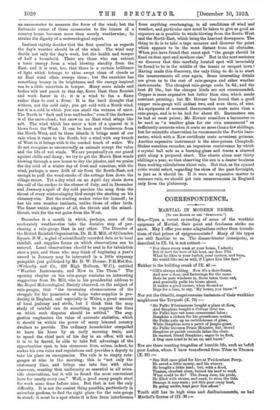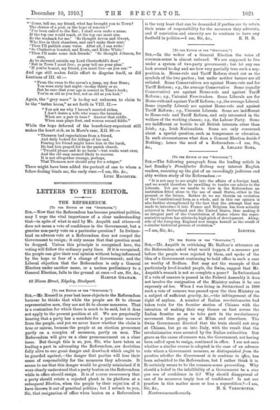CORRESPONDENCE.
MARTIAL IN MODERN DRESS. [To THE EDITOIL OP TEE "SPECTATOR."]
Sis,—Upon a recent re-reading of some of the worthier epigrams of Martial, their point and freshness strike me anew. May I offer you some adaptations rather than transla- tions of that prince of epigrammatists P Many of his types are still familiar to us. The dinner-hunter (coenipeta), as described in IX. 14, is not extinct:-
" Fox dines every week at your house, I admit ; But it isn't for love of his host, my dear Pitt. What he likes is your turbot, your oysters, and hare, He would like me as well, if I gave him like fare."
Neither is the building crank of IX. 46 :--
" Gill's always adding. Now it's a door-frame, And now a door, and fastenings for the same. Here he puts windows in, there takes them out, And generally pulls his house about.
It makes a good excuse, when So-and-so
Begs for a loan, to say, ' My house, you know."
Nor yet the Otacilii, megalomaniac imitators of their wealthier neighbours the Torquati (X. 79) :- " Sir Fulke Fitzsimmons bought a place at Kew, And Simpkins bought a Cottage Orni too. Sir Fulke lays out some ornamental lakes ; Simpkins a cistern for his greenhouse makes. Sir Fulke puts up an orchid-house of glass, While Simpkins sows a patch of jungle-grass. Sir Fulke becomes Prime Minister, but, there Simpkins at parish councils takes the chair. Be warned, friend Simpkins ; eager to be first, A frog once tried to be an ox, and burst."
Nor are there wanting tragedies of humble life, such as befell poor Ladon, whom I have transferred from Tiber to Thames (X. 85) :—
" Ben Bolt once plied for hire at Twickenham Ferry. He saved a little money, and his wherry. He bought a little land; but, with a flood, Thames, churlish river, turned his land to mud- What could he do ? The Saucy Jane, his pride, He filled with stones, and sunk, to stem the tide. Strange it may seem; yet this poor crazy boat, By going under, kept poor Ben afloat"
Youth still has its high aims and disillusionments, as had Martial's Sextus of IIL 38 :—
"" Come, tell me, my friend, what has brought you to Town? The chance of a post, or the hope of renown ? ' `I've been called to the Bar ; I shall soon make a name.
If the top one would reach, at the top one must aim. So the woolsack for me.' So thought Arvon and Gwent, Who live in their chambers, and can't make their rent.'
Then I'll publish some verse. After all, I can write.' So Chatterton boasted, and Keats, and Kirke White.'
Then I'll make some rich friends.' So thought Johnson, for sure, As he shivered outside my Lord Chesterfield's door.' `But in Town I must live ; so pray tell me your plan.' 'If you're honest, my friend, you must live—as you can."
And age still makes futile effort to disguise itself, as did
Lentinus of III. 43:— "From the swan to the raven's a jump, my dear Beau; You were sixty last night—to-day thirty or so. But be sure that your age is correct in Time's book; You're as old as you feel, not as old as you look."
Again, the " grey mare" is to-day not unknown to claim to be the " better horse," as set forth in VIII. 12 :— "You ask me why I haven't married riches, I don't desire a wife who wears the breeches. When are a pair in tune ? Answer that riddle. When man plays first, and woman second fiddle."
While the hope deferred of the beneficiary-expectant still makes the heart sick, as in Maro's case, XII. 90 :—
"Thomson had expectations from a friend,
And daily looked for tidings of his end. Fearing his friend might leave him in the lurch, He had him prayed for in the parish church.
"Twould please and do no harm'—but weeks went over,
And the old man seemed likely to recover.
It is not altogether strange, perhaps, That Thomson now should pray for a relapse."
There might have been added the portrait of one to whom a fellow-feeling hinds me, the early riser.—I am, Sir, &c.,
LUDI MAGISTEE.



























































 Previous page
Previous page